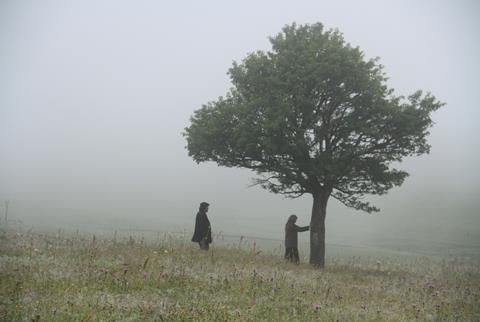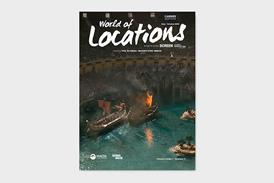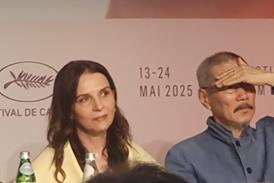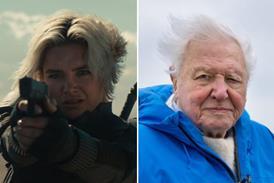Dir. Ozcan Alper. Turkey, France, Germany, Georgia, 2015. 122 min.

This must be one of the most handsome films of the year and its star, without any doubt, is Greek cinematographer Andreas Sinanos. His images of the dense forests covering the mountains separating Turkey from Georgia, taken at all hours of the day and night, in every kind of weather, are bound to knock arthouse audiences off their feet, reminding them of the great work Sinanos did for Theo Angelopoulos in his latter films.
Alper’s attempts not to step too hard on any sensitive toes force him to keep his narrative in a chiaroscuro state, hinted at rather than fully expressed
Wrapped in this spectacular robe, Ozcan Alper ventures here into uncharted territory, tackling a risky, taboo issue, the Armenian genocide, whose existence has always been and is still denied by whatever Turkish regime is in power.
Audiences unfamiliar with the history and politics of the region may find it difficult at first to put in the right context Alper’s acrobatic act of dealing with the tragedy of the Armenian people without ever putting a name on it. But once they do, they will have to appreciate his courage and accept some of the compromises imposed by the circumstances. An arthouse selection with distinct festival potential, first unveiled earlier this year in Hamburg (whose Film Fund backed the production), Memories Of The Wind may need some marketing support to open more doors in the future. The Antalya Audience Award can certainly help.
Alper, who has already explored the Turkish mountains by the Black Sea from a different perspective in his first film, Autumn, is back there again for almost the entire length of his new feature, in which they serve as the hiding place for Aram (Onur Saylak), a dissident writer on the run, whose name is the only hint offered by the script about his Armenian origins.
The same goes for Aram’s recurring nightmares in which he relives the tragic events of his adolescence. They all bear a specific date (1915) which leaves little doubt about the events they refer to, but neither the victims nor their tormentors are given an ethnic identity. Yet these flashes of the past are hazy enough to argue that they suggest the fate of any and all displaced people in the world who have been chased away from their homes and deprived of their possessions. As for the train scenes, they will no doubt bring up associations with iconic Holocaust imagery.
Suspected of being a communist sympathiser, Aram has to flee Istanbul during the latter half of the Second World War. Placed by his friends in a remote mountain house near the border with the Soviet Union, he is supposed to wait there for the arrival of the necessary papers that will authorise his trip across country lines.
Until then, he stays in the home of a surly, taciturn, heavy set Turkish man, Mikhail (Mustafa Ugurlu) and his wife, Meryem (Sofia Khandamirova), a Russian girl he married when he worked as a baker in Sochi. She has the looks of a Madonna, is half her husband’s age and barely utters a word as she moves around silently, minding the household. The couple, who behave as if they have nothing in common except their lodgings, put Aram in their attic, away from the prying eyes of Turkish police informers. There, prey to his own fearful hallucinations, he keeps drawing, first in a notebook, later on pieces of wood, black and grey charcoal images of a family that doesn’t exist anymore.
As Aram’s documents fail to materialise and time passes, the lack of communication between these three characters can hardly disguise, on the one hand, the latent but growing sexual infatuation between Meryem and Aram, and on the other, Mikhail’s concerns over being betrayed to the authorities, which leads him to take his forbidden guest even further away, to a derelict shack in the woods.
While the visual backdrop for all this is exquisitely provided by Sinanos, Alper’s attempts not to step too hard on any sensitive toes force him to keep his narrative in a chiaroscuro state, hinted at rather than fully expressed. A less schematic approach would have helped viewers to better follow the proceedings while digging deeper into each of the characters might have provided performers with more material to work with, and made their roles clearer and better defined. All this is useful in keeping the audience alert through several long stretches of atmospheric inactivity.
Still, political references come out loud and clear in the end. Ankara’s sympathy for the Nazis during the Second World War is very much in evidence throughout the film’s opening scenes as well in the official broadcasts during the war, and allusions to the ever latent Turkish-Russian mutual hostility are brought into focus just at the moment when it seems to be raising its ugly head again, reminding us that the world that the truce between these two nations is never to be taken for granted.
Production companies: Nar Film, Most Productions, Istanbul Digital
Producers: Soner Alper, Mustafa Oguz, Ali Bayraktar
World Sales: Nar Film, info@narfilm.com
Screenplay: Ozcan Alper, Ahmet Buke
Cinematography: Andreas Sinanos
Editing: Baptiste Gacoin, Ozcan Alper
Music: Francois Couturier
Cast: Onur Saylak, Sofia Khandamirova, Mustafa Ugurlu, Ebru Ozkan, Murat Daltaban, Tuba Buyukustun























![The Brightest SunScreen[Courtesy HKIFF]](https://d1nslcd7m2225b.cloudfront.net/Pictures/100x67/3/5/0/1448350_thebrightestsunscreencourtesyhkiff_312678.jpg)









